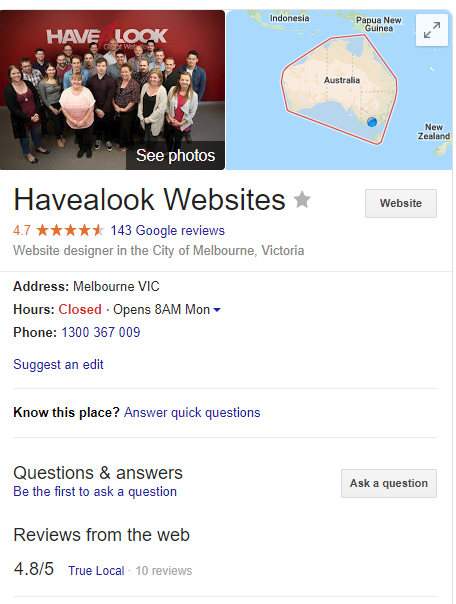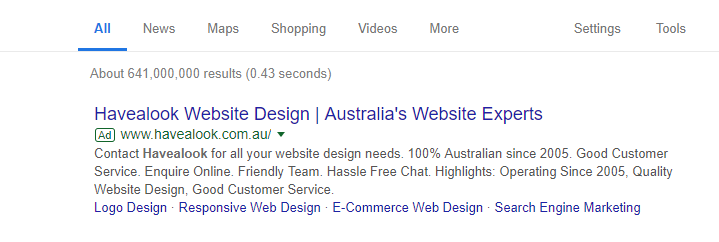If you wanted to make sure someone never found your business, how would you do it? The answer is simple: appear on page two of Google search results.
A whopping 90% of Google users don’t bother to click on past page one, so for businesses trying to leverage a better web presence, there’s really no better place to be than in those first returned listings. But achieving that real estate is tricky, and takes a strategy full of white-hat techniques and SEO efforts to truly gain success. The pages you see at the very top of page one (who haven’t paid to be there) have probably put in the hard yards to stick to that spot, and if they’ve done it well enough, they won’t be going anywhere too quickly.
Unfortunately, landing on that podium is half the journey – the other half is making sure someone doesn’t overtake you afterwards. So if users are only turning their attention to the first page of search engine results (SERPs), how can you take advantage of this behaviour? Is there even a way?
The truth is, there is a way, but it’s a long journey that deserves care and attention from a professional who knows how to implement the best possible tactics. The websites at the top of Google have usually gained a very attractive domain authority, meaning outranking them isn’t always easy. Luckily, there are some ways businesses can look to ramp up their SEO efforts to be in the spotlight when that 90% of users are looking across page one for answers.
Reasons you’re not on page one of Google
Think about this for a second: 380 websites are created every minute of every single day. That’s around 547,2000 new platforms hitting the web before the sun sets. Those are some mammoth numbers to take into consideration, but pair that with the fact that a majority of these are fighting for a place on page one of Google, and you’re suddenly left wondering what you can even do to combat it.
Luckily, Google’s algorithms do make it a lot fairer for those who have put in the long, hard yards to collecting good, consistent traffic and who have been around for long enough. If your business has a website that’s been there for a while but needs a bit of TLC, then you’re already on a good enough track. It’s just going to take some added work.
If you’re one of those people that refreshes Google minute in, minute out and not seeing your brand at the top of the results, there is a reason for it. The search giant isn’t saying you’re not worthy enough of being seen, but there happen to be others out there that may have a slightly better strategy, authority or overall web presence.
So why exactly aren’t you one of those top dogs on Google? It’s probably for a combination of the following:
Google doesn’t know you’re a business
The search engine is pretty smart at most things, but it can’t keep track of every single website’s origin and intentions. The best way to ensure it knows you’re all about business is to let it know. That means setting up a Google My Business listing (it’s free) and taking control of how the giant views your website. From business contract details through to photos and location specifics – it’s an unparalleled way to lift your SEO efforts across the board.

Your site isn’t optimised enough
This is a broad one, but the most important. Search engines need to prioritise sites over others using specific, complex algorithms that sift through the clutter. It’s what separates you from page one to two, and just how well you’re seen in the eyes of the bots that crawl your page. If you’re not implementing enough of the right tactics to be “favoured” by these little Google minions, you’re not doing yourself any favours in the optimisation field.
So what does it take to optimise a website? A lot. And then a whole lot more. Combining technical metadata with backend tweaking, on-page and off-page content and a whole lot more – optimising your website to be seen in the best possible light is a huge task. For this reason, it’s often better to let an SEO technician do the hard yards for you, so they can keep an eye on what aspect of the optimisation is performing well and what’s not.
Your keywords are too competitive
There’s not a whole lot of point trying to rank for keywords that absolutely every man and his dog are already trying to snatch up traffic for. This is where proper, thorough keyword research comes into play, picking out opportunities within phrases that are relevant to your business and gaining traffic but aren’t being tapped into competitors just yet.
If you’re a local business, ensuring your search terms match the geographical context of searches – e.g. ‘website design in Melbourne’ – you’re more likely to garner traffic from an interested audience that’s in your vicinity. Choosing to try your luck with ‘website design’ alone may end up in a lack of results, and you definitely won’t find your business sitting on the throne of page one (unless you’re a significant player with enormous domain authority).
You’re not using paid channels
While SEO is one of the most advantageous avenues for digital marketing, powering up this organic strategy with a paid one can further collect much-needed traffic. Utilising Google AdWords and remarketing means you do have to invest a little bit of cash into it, but you’re likely to see some pretty solid results as an outcome. Why? Paid tactics like this guarantee you a spot on page one of Google, so you’re landing right in front of the eyes that matter most.

Your reviews aren’t so great (or are non-existent)
If you haven’t jumped onto the Google My Business bandwagon yet, then you probably don’t have any reviews to go with it. But if you do have this setup and you’re reeling in that feedback, it’s time to assess the results. Positive reviews have a significant effect on search results, and for those that aren’t well favourited, ranking signals can drop off here. Add to that Facebook reviews, Yelp or Tripadvisor ratings and more, and you can point a whole lot of positive words back to your website, allowing your SEO rankings to benefit as a result.
Your backlink profile isn’t quite hitting the mark
When other websites link back to yourself within content, this is known as a backlink. Pointing towards your site plays a beneficial role in rankings, but only if they’re quality-driven. Spamming backlinks from low-quality sources is not ideal, and Google’s far too smart to be outplayed like this. Instead, try to create a backlink profile that’s based on mutual, authentic connections with those around your network. The more quality backlinks attached to your site, the more likely you are to rank on that nifty page one real estate.
Why sitting on page two of Google is no good
If you’re still sitting there wondering what the big deal is about being on page one, consider the fact that page two off Google results receives about 4.37% of traffic. Add to that page three collecting around 2.42% and the fifth at 1.07% and you can start to see a pattern.
Stop and think about the last time you entered a search into Google and clicked through to page two or three of search results. If you did, did you find the answer you were looking for? In a world where consumers are so heavily time-poor, businesses who can land the right solution in front of their eyes when they need it the most, are the ones that come out on top. The nature of the game is that if a user happens to stumble onto your website from page seven of Google SERPs, it’s probably because their cat was climbing on their desk at the top and is responsible for the click-through.
If a tree falls in the forest, does it even make a sound? Probably. But no one was there to hear it because it wasn’t where they were.
